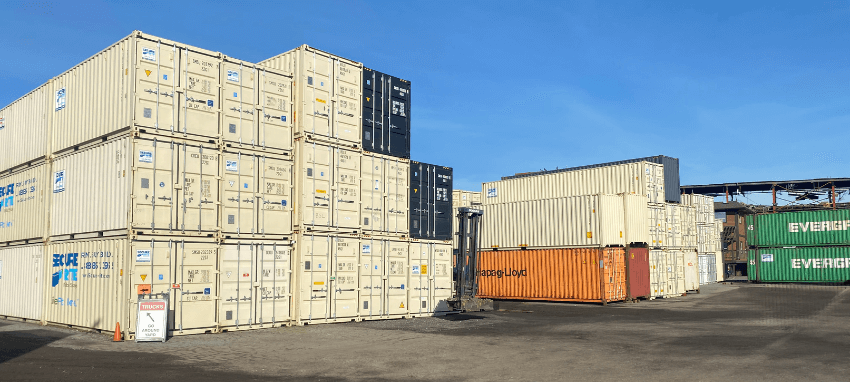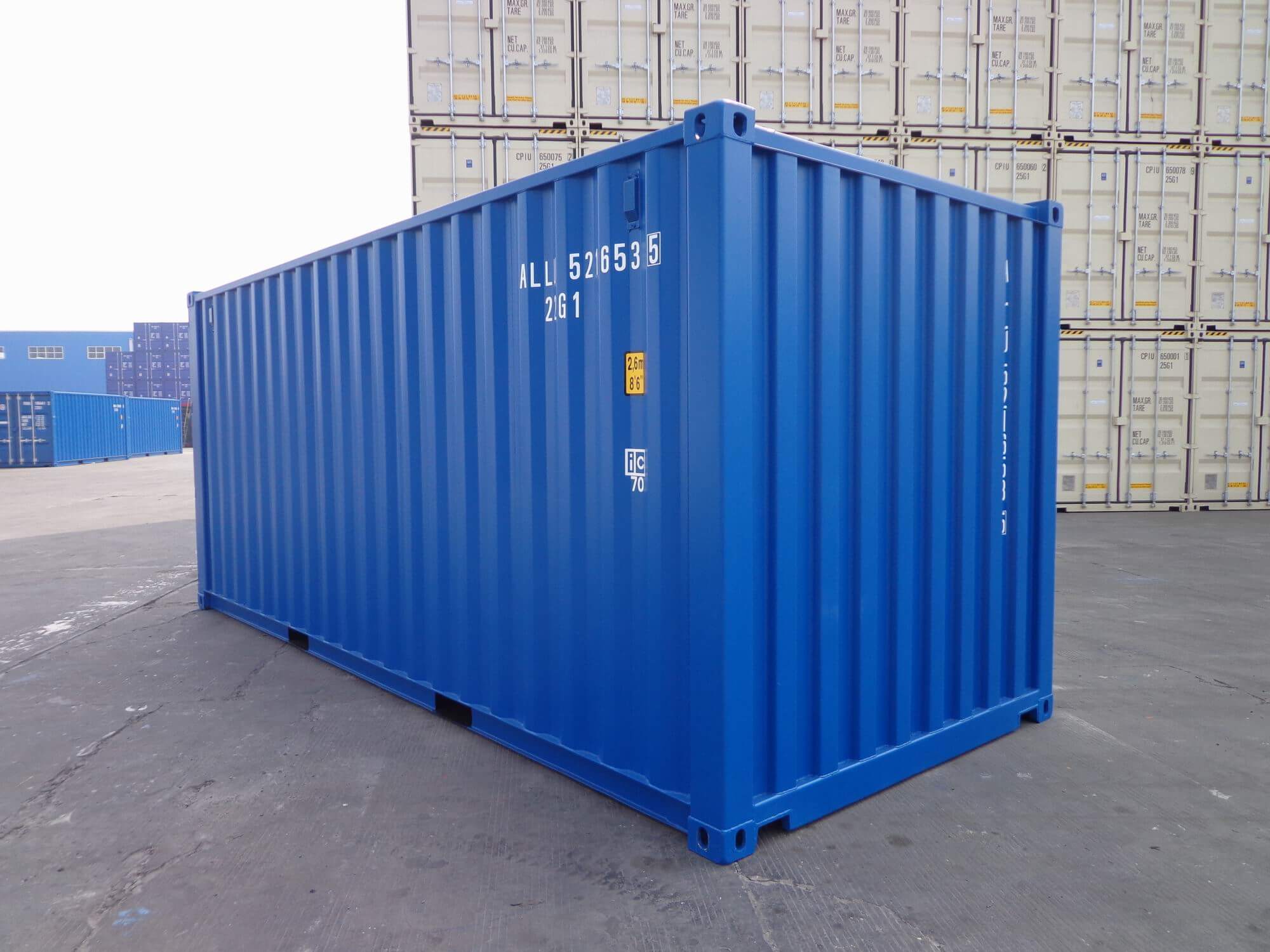Whatever You Need to Learn About Shipping Containers and Their Practical Applications
Shipping containers have developed from mere devices for transport to functional frameworks with various practical applications. Their robust design and conventional sizing make them perfect for a range of uses beyond shipping. From innovative real estate options to sustainable farming, their adaptability is significant. The possibilities do not end there. Discovering their different features discloses unexpected insights into modern difficulties and imaginative solutions. What various other roles could these containers play in today's world?
The Design and Structure of Shipping Containers

Inside, containers are created to make the most of space, typically including wood or steel floor covering that can sustain substantial weight. Air flow systems may be incorporated to stop moisture build-up, which is critical for delicate cargo. Furthermore, reinforced corners permit for very easy handling by forklifts and cranes, promoting smooth loading and dumping. This thoughtful layout and structure contribute to the containers' convenience throughout numerous shipping and storage applications.
Advantages of Making Use Of Shipping Containers
While lots of transportation approaches have their advantages, making use of shipping containers stands out as a result of their unequaled flexibility and efficiency. Shipping containers offer a standardized size, making them simple to stack and move throughout various settings of transport, including ships, vehicles, and trains. This standardization reduces filling and discharging times, therefore raising total efficiency.
Moreover, shipping containers are created from sturdy materials, giving durable security for items during transportation. They are safe and weather-resistant, decreasing the risk of damages from environmental aspects or theft. Furthermore, the modular layout of shipping containers permits for easy customization, making it possible for organizations to adapt them for numerous objectives, such as storage or mobile workplaces.
Their mobility and cost-effectiveness make shipping containers an appealing choice for companies looking to enhance logistics and supply chain procedures. These benefits add to the growing appeal of delivery containers in numerous markets.
Imaginative Housing Solutions With Shipping Containers
Cutting-edge real estate options have emerged as an exciting application of delivery containers, leveraging their fundamental staminas for property usage. These functional frameworks supply a lasting option to conventional building materials, typically at a fraction of the price. Developers and engineers have actually transformed containers into stylish, functional homes, accommodating diverse lifestyles and preferences.

Shipping containers are environmentally pleasant, advertising recycling and decreasing waste. Many projects concentrate on power effectiveness, integrating photovoltaic panels and eco-friendly roofing systems. As urbanization boosts, these ingenious real estate remedies offer a practical response to housing shortages while promoting a special architectural visual.
Shipping Containers in Retail and Pop-Up Shops
An expanding number of merchants are turning to shipping containers as a vibrant option for pop-up shops and retail spaces. These functional frameworks use an affordable option to typical store fronts, permitting organizations to create special, appealing environments that attract clients. Their modular design enables simple transport and setup, making them ideal for momentary or seasonal retail areas.
Retailers can tailor shipping containers to show their brand name identity, changing them into aesthetically appealing stores that stick out in congested industries. The small nature of containers additionally motivates effective usage of area, enabling innovative layouts that enhance client flow and engagement. Shipping containers can be situated in unique locations, such as vacant lots or city parks, enhancing ease of access and foot traffic.

As the retail landscape develops, shipping containers offer a innovative and flexible solution that meets the demands of modern customers while boosting the purchasing experience.
Lasting Farming Practices Using Shipping Containers
Lasting farming methods significantly incorporate shipping containers as innovative solutions for agriculture - Shipping Containers. These container ranches utilize hydroponics to maximize area and source effectiveness, supplying an affordable approach to food manufacturing. By changing shipping containers right into agricultural centers, farmers can address food safety and ecological worries concurrently
Container Farming Advantages
While typical agriculture deals with difficulties such as land scarcity and environment adjustment, container farming provides a feasible choice that takes full advantage of space and resources. This cutting-edge approach permits year-round crop production in regulated environments, lowering reliance on climate condition. Container ranches utilize much less water than conventional farming, advertising sustainability and conservation. They can be established in urban locations, bringing fresh produce closer to consumers and minimizing transport discharges. In addition, the modular nature of delivery containers makes it possible for scalability, permitting farmers to adjust operations based upon demand. Container farming additionally decreases chemical use by developing an enclosed community, inevitably improving food safety. As city populations expand, container farming becomes a useful option to fulfill the boosting demand for neighborhood, lasting food resources.
Hydroponics in Containers
Hydroponics, which allows plants to expand without soil by making use of nutrient-rich water, grows within the boundaries of delivery containers, making it an optimal method for city agriculture. These containers produce a regulated atmosphere that maximizes temperature level, humidity, and light, allowing year-round cultivation. With minimal space in urban areas, Clicking Here shipping containers use a scalable service for expanding fresh fruit and vegetables. Hydroponic systems within containers can consist of various strategies, such as nutrient film technique (NFT) and deep water society (DWC), which optimize return while minimizing water usage. This innovative strategy not only boosts food safety and security but additionally lowers the carbon impact connected with typical farming methods. As a result, hydroponics in containers stands for a forward-thinking solution for sustainable city food manufacturing.
Affordable Agriculture Solutions
As food manufacturing deals with enhancing challenges due to environment modification and urbanization, shipping containers emerge as an affordable solution for farming. These flexible structures can be repurposed for numerous sustainable farming practices, such as hydroponics and vertical farming. By utilizing regulated atmospheres within containers, farmers can maximize development cycles and lower resource intake, consisting of water and fertilizers. Furthermore, shipping containers can be tactically put in urban locations, reducing transport expenses and enhancing access to fresh produce. Their modular nature enables scalability, allowing farmers to broaden operations as need expands. Additionally, repurposing containers adds to throw away reduction, lining up with environmentally friendly agricultural efforts. In general, delivering containers existing ingenious possibilities for lasting and effective food production.
Emergency and Disaster Relief Applications of Shipping Containers

Organizations frequently make use of delivery containers to create mobile facilities or field hospitals, ensuring that treatment reaches those in need. In addition, they can be transformed right into command facilities for collaborating rescue procedures, thereby improving business performance during situations.
Containers can be modified to keep necessary items such as food, clothing, and water, guarding materials until look at here now they are distributed. Their flexibility enables them to be quickly moved to various places, ensuring that aid gets here where it is most quickly required. Generally, shipping containers play a crucial function in boosting the efficiency of calamity relief efforts worldwide.
Regularly Asked Inquiries
Exactly How Are Shipping Containers Transported From One Location to An Additional?
Shipping containers are delivered through trains, trucks, and ships, using cranes for packing and discharging. This multi-modal transportation system makes certain reliable activity throughout land and sea, attaching global supply chains and facilitating worldwide profession.
What Is the Average Lifespan of a Shipping Container?
The average lifespan of a delivery container typically ranges from 10 to 25 years, depending upon upkeep, use, and environmental aspects. Correct treatment can expand their usability, while forget might result in damage and damages.
Can Shipping Containers Be Changed for Various Uses?
Yes, delivering containers can be customized for different usages. They function as homes, workplaces, pop-up shops, and storage units. Their convenience allows for imaginative adjustments, making them appropriate for a wide variety of applications.
Are Shipping Containers Eco Friendly?
Shipping containers can be visit this website eco-friendly, as they promote repurposing and reusing. Their longevity minimizes waste, while their use in different real estate and companies decreases the demand for new materials, adding to sustainable techniques.
Exactly how Do I Select the Right Dimension Shipping Container?
To pick the ideal dimension delivery container, one must analyze storage space needs, consider the intended use, and review area availability - Shipping Containers for Sale. Common dimensions include 40-foot and 20-foot containers, each serving numerous storage and transport demands successfully
Cutting-edge housing services have actually emerged as an amazing application of shipping containers, leveraging their fundamental strengths for property usage. The versatility of shipping containers allows for innovative formats, from single-unit residences to intricate multi-container plans. Sustainable farming methods progressively incorporate shipping containers as innovative options for farming. Furthermore, the modular nature of delivery containers enables scalability, allowing farmers to readjust operations based on demand. Hydroponics, which enables plants to grow without dirt by using nutrient-rich water, flourishes within the confines of delivery containers, making it an ideal method for urban agriculture.